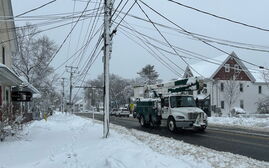Processing Your Payment
Please do not leave this page until complete. This can take a few moments.
While ski resorts cope with climate change, condos are still in demand
Evan Hackel, a management consultant who lives year-round in Reading, Mass., has skied with his family at the Sunday River ski resort in Newry since 1996.
At first they'd go once or twice per year. Then they bought a condominium there. While the drive was longer that it was to favorite ski areas in New Hampshire and Vermont, Sunday River's lift lines are shorter and it has consistent snow-making. They could stow gear at the condo and enroll the kids in ski programs. They were paying the mortgage, so they had no excuses not to go.
Since the purchase of their first slopeside (versus off-mountain) condo in 2000, with an upgrade in 2006, the Hackels wake up at the slopes, eat lunch at the condo, hit the development's heated pool in the evening. In the off-season, they kayak, hike and go to community festivals.
It's been a good investment, says Hackel.
“I bought my first condo for $230,000 and sold it six or seven years later for $500,000,” he says. “I made a lot of money. That made me feel good about buying the condo. If your investment pays off in two ways — enjoyment and making money — that's a good thing.”
Hackel expects that investment to continue to pay off, even with fluctuations in the ski industry and the threat of climate change.
“If you plan on just owning your condo and not selling, fluctuations matter little,” he says.
Condo market strong
Real estate brokers are seeing other condo buyers like the Hackels — skiers who want to spend time with family and also enjoy a growing suite of off-season activities.
Although Maine's ski resorts face uncertainty around climate change, the consensus among industry experts and Realtors is that it's not expected to substantially impact the condominium market, due to factors offsetting potentially deleterious effects.
Greg Sweetser, executive director of the Ski Maine Association in Portland, says this winter was typical — a great snowy start, then 50-degree temperatures, then March snowstorms. The season will average 1.2 million visits — a steady number despite variable weather, he says.
Mitigating factors start with snowmaking technology.
At Sunday River and Sugarloaf, Mark Hall, senior vice president of owner Boyne Resorts, says resort owners are doing more to manage the uncertainty through snowmaking.
“That's strengthened the real estate market at both resorts, and the commitment from our guests who know they can rely on consistency. We do get seasons where we have challenges, but we've got the technology and capacity, for the most part, to overcome those challenges,” Hall says.
If there's a connection between fickle weather and the condominium market, it's not a clear one, says Sam Punderson, a broker with Mountainside Real Estate, an arm of the Sugarloaf Corp. He cites the horrendous ski conditions in January and February 2016, which nonetheless ushered in a buying spree in March.
“It was a total head-scratcher for us,” he says. “The skiing was so bad and we were sitting around the office saying, 'This is going to be a thin year.' Then it was like somebody flipped the switch.”
Dire climate predictions aren't deterring buyers either.
“Our numbers have been going up,” Punderson says.
“Whether you're skiing or going to Disneyland, housing is everything,” says Carrabassett Valley Code Enforcement Officer Bill Gilmore. “It's continued to grow, and as long as the economy stays reasonably sound, it will probably grow indefinitely.”
Expanding off-season activities
Experts also attribute steady condominium demand to increased off-season activity, like expanded mountain bike trails on and around Sugarloaf.
“Slowly but surely the whole area has been discovered by a lot more people using the mountain as a four-season resort,” Punderson says. “I think that's made a big difference selling condominiums the last few years. More and more are saying, 'We've thought about buying a place up here for ages but we couldn't justify just having a winter place. But now that we hike or mountain bike or canoe more, it's great coming up here during the summer and enjoying everything the area has to offer.'”
“A lot of families buy the ski house and then say, 'Since we have the place we should go up at least once in the summer,'” says Susan DuPlessis, owner of the Mountain Real Estate Co. in Newry. “They end up liking it.”
Brokers for Sugarloaf and Sunday River condominiums say inventory is tight because of demand and also a growing tendency of owners to generate short-term rental income from their condos when not in use. And they expect new development, as promised in the coming years by the new owner, Michigan-based Boyne Resorts, to be snapped up.
Condo prices are affected by things like size, amenities, condition and views. Slopeside condos like the Hackels' — allowing them to hit the slopes from their front door — tend to come with a higher price tag.
DuPlessis says 350-square-foot slopeside studio condos at Sunday River sell for as low as $68,000, multi-bedroom townhomes of 3,200 square feet as much as $760,000. Off-mountain prices range from $95,000 to $300,000.
Hackel, a former president of his condo association, recalls that condo prices rose “dramatically” during his family's first seven years at Sunday River, starting in 2000, then plummeted during the recession.
“I think they're just now starting to tick up,” he says, adding that he thinks Boyne's purchase of Sunday River and Sugarloaf could greatly increase value: “I think it will allow them to invest and improve the ski experience, which will increase demand from people who want to own real estate at Sunday River.”
Strong demand
Whatever the price, the Sunday River market is hot, says DuPlessis. In her 14 years, “I've never seen inventory as low as it is right now.” That started about 18 months ago. “I hear brokers say the market is hot for primary residences, but this is the first time inventory has been this low for secondary.”
For one-bedroom condos, her inventory is typically 18 to 22 units.
“This winter, we've been listing maybe four or five, and now we have only two to three available,” she says. That could be because many condo owners today are offering short-term rentals, she says.
At Sugarloaf, Punderson says, “We've just come off three strong years, with pretty strong increases.”
In 2015, the agency had 96 sales worth $21.8 million. For 2016, it was 103 sales for $23.7, and in 2017, 120 sales for $28.5 million.
The jumps were likely a result of buyer confidence in the economy, Punderson says. Most of his buyers come from southern Maine and Bangor, where real estate markets are hot. “I think people's primary homes values have gone up, so it's been easier for them to use the equity to buy second homes.”
In 2017, the average sale price of existing inventory was $238,000. Newly developed inventory is now trending closer to $500,000, says Punderson. “I think that speaks to the niche developers thought could be profitable,” he says.
More inventory coming
Hall says Boyne has long-term plans for several hundred units of development each at Sunday River and Sugarloaf.
“There is limited inventory at each resort, and because the developments at each resort are aging, there's also demand for newer, modern condominiums and town homes that have modern amenities,” he says.
Hall says neither Sunday River nor Sugarloaf saw the extent of price erosion other resorts did during the recession, likely because of the prevalence of owner-users willing to hang on, as opposed to investors who lease out.
“Although prices did drop somewhat, they held up fairly well and have continued since 2009 to climb back up to pre-2007 prices and even beyond,” says Hall. “We think the market is there for new condominiums.”
















Comments